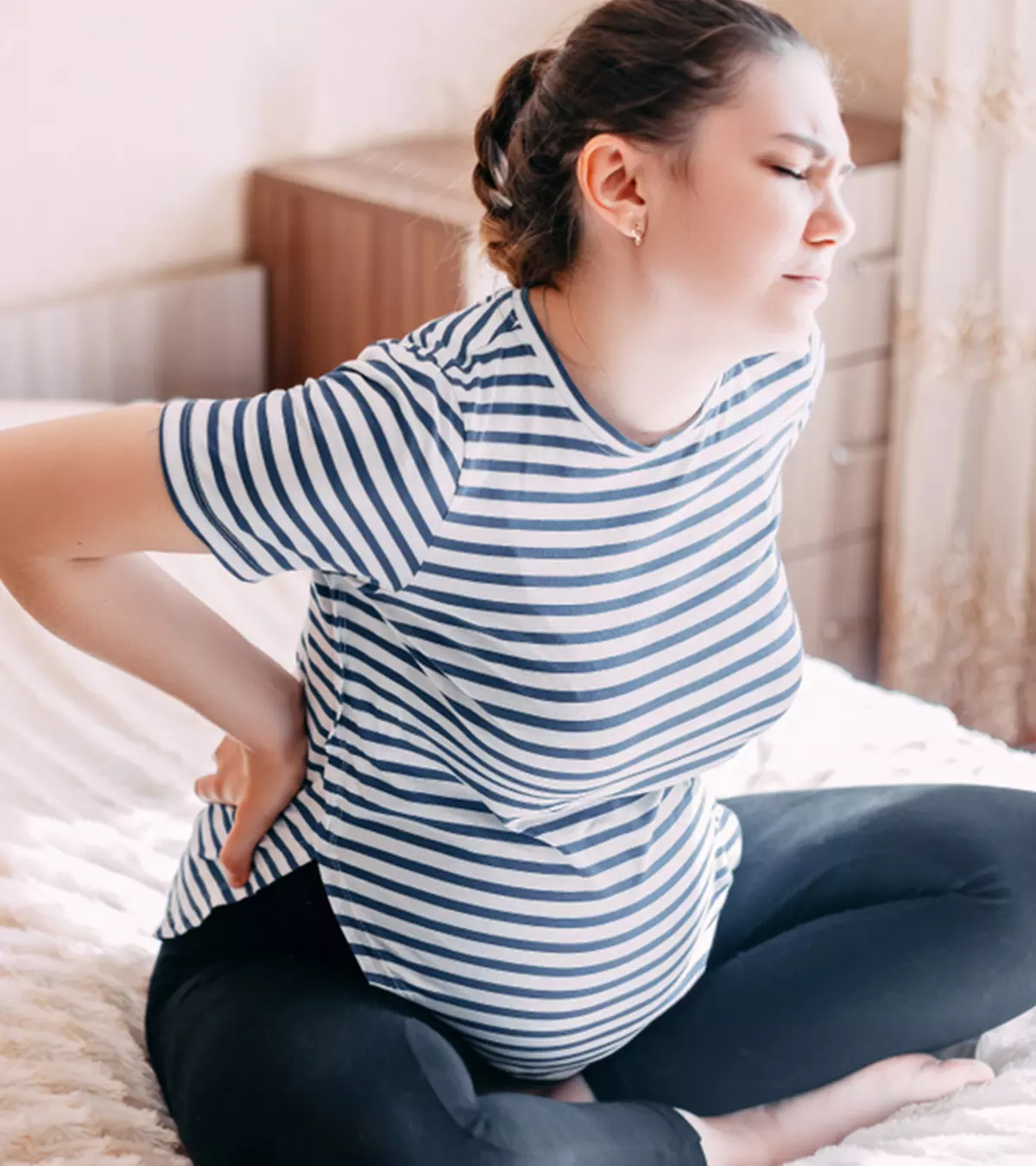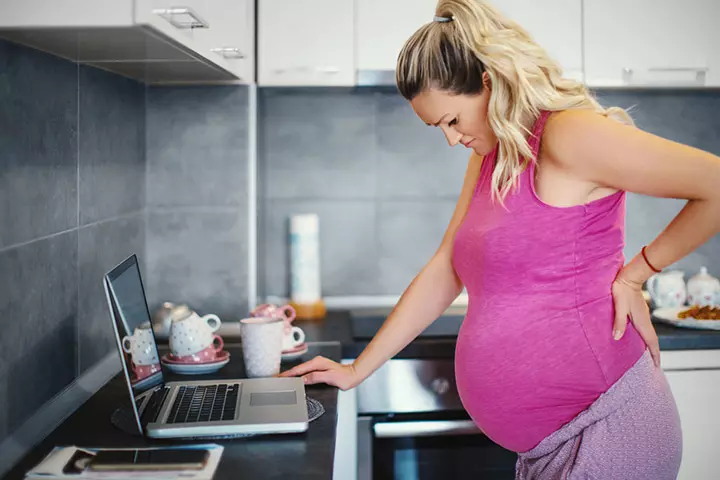
Image: Shutterstock
Back pain is a common ailment that expecting mothers have to deal with. During pregnancy, women go through significant changes in their bodies. Changes in the pelvic region along with the gain of extra weight combined with myriad other factors often contribute to pain in the lumbar regions. The pain is more common to occur during the second or the latter half of the pregnancy.
Back pain starts early in pregnancy and gradually increases over time (1). Studies reveal that around eighty-five percent of women with a back pain history in earlier pregnancies are susceptible to recurring back pain in the subsequent pregnancy (2). It is, however, not permanent and will usually go away soon after the baby is born. In some cases, the pain may continue postpartum (3). Let’s dive in deeper to know more about the case of back pain during pregnancy:
1. Is It Normal To Have Lower Back Pain During Pregnancy?

Image: Shutterstock
The lumbar area, commonly referred to as the “lower back”, bears the burden of the weight of the body. During pregnancy, the female body goes through many biological and physiological changes some of which also put a strain on the back muscles. This is a completely normal phenomenon seen in expecting mothers especially towards the later months of pregnancy. Data shows that fifty to seventy percent of women experience lower back pain during pregnancy (4). In certain cases, the deviation from proper body alignment can exacerbate the problem, increasing the pain and discomfort manifold. Stretching and body alignment techniques can be of great assistance for such cases (5).
2. What Are The Causes Of Back Pain During Pregnancy?

Image: IStock
The most common back pain complaints that women experience during pregnancy are Low Back Pain (LBP) and Pelvic Girdle Pain (PGP) (2). Following are some of the common problems that are identified as causing back pain in expecting mothers:
- Weight gain during pregnancy is a major cause of back pain. With an increase in the body mass, the body’s center of gravity shifts to accommodate the enlarged uterus. This puts additional stress on the lumbar and pelvic regions which often manifests into back pain (2).
- Your baby is growing in size. So, when abdominal muscles are stretched to accommodate the growing baby, the pressure on the spine increases, causing fatigue in the pregnant mother (2)..
- The natural mechanism of the female body prepares a flexible passage for the baby. This is usually done by certain hormones. However, when the hormones ease out the joints for the passage, the muscles can get affected causing back pain. This is commonly seen in the pelvis area (3).
- Lower back pain is interlinked with stress and has been shown to have varying degrees of effect (6). Pregnancy is certainly a stressful time for most mothers. All the stress building from the worry and the physical pain can manifest and contribute towards lower back pain
- The growth of the fetus inside the body often causes some degree of curvature of the lumbar spine in the mother. The intensity of curvature is more so during the third trimester of pregnancy. As the spinal curvature increases, women can feel varying degrees of pain in the lower lumbar region .
- A bad posture can also act as a major source of spinal issues. Slouching and bent poses, especially while using laptops or mobile phones for prolonged periods can result in back as well as shoulder pain.
3. What Can You Do About Your Back Pain During Pregnancy?

Image: IStock
Regular exercise before pregnancy can significantly reduce the intensity of pain experienced during pregnancy. Aerobic or physiotherapy exercises have been proven to counter back pain.
Maintaining a proper posture can help pregnant women counter severe back pain. An upright posture will support your back and significantly reduce any misalignment or backload that intensifies the pain. Here are some correct standing, sitting, and lying positions to try out during pregnancy.
- Keep your chin and pelvis tucked in. Tilting your head sideways, forward or backward, can aggravate back pain.
- Ease the tension on your shoulders, back, neck and hips so that your body is well-supported. Avoid arching your lower back as much as possible. Sit and stand straight.
- Avoid sitting or standing for a long time in a similar position. Take frequent breaks between work so that your lower back muscles do not get strained. Walk around every hour to ensure proper circulation.
- While sitting, do not slouch. Keep your shoulders relaxed and your elbows near your body.
- Have good back support when you sit in a chair. Go for lumbar supports to maintain your back posture and relieve the pressure off your back.
- Keep your back straight, squat, and lift things without bending at the waist.
- As your pregnancy progresses, it is best to sleep on the side. Sleeping on the side will ensure that you are comfortable while napping in the day or taking a long night’s sleep. Bend both knees or just one and keep soft pillows under your belly and between your legs to support your muscles.
- Turn around the chair’s back to the front and sit on it as you lean towards the back and rest your belly. A small cushion for support will help you feel comfortable.
- If you have to manage household chores or run errands, exercise some caution. Try moving slowly and avoid hurrying to finish your tasks, or you could end up worsening your existing back pain.
- Avoid unnecessary twisting and bending to prevent back pain. However, if the twisting is part of a good stretch routine don’t forget to do it once in a while.
- Resting your feet on an elevated surface can also help you minimize back pain during pregnancy. If you have to stand for prolonged hours, place your leg on a small stool.
Backaches during pregnancy can be a draining experience if proper precautions are not taken to alleviate pain. A poor posture will aggravate back pain and cause complications. Follow these simple posture tips to reduce any discomfort. If you fall, hurt yourself, or suffer an injury, immediately seek your doctor’s help to treat inflammations. Enduring the pain in silence is not the right thing to do. Also, self-treatment under such circumstances could be dangerous for you and your baby. How did you deal with back pain during your pregnancy? Do share your experience with us in the comments section below!
References
- Back Pain During Pregnancy: A Prospective Study
https://pubmed.ncbi.nlm.nih.gov/8882692/ - Pregnancy-related Low Back Pain
https://www.ncbi.nlm.nih.gov/pmc/articles/PMC3306025/ - Back Pain During Pregnancy
https://www.acog.org/womens-health/faqs/back%20pain%20during%20pregnancy?utm_source=redirect&utm_medium=web&utm_campaign=otn - Back Pain During Pregnancy
https://americanpregnancy.org/healthy-pregnancy/pregnancy-health-wellness/back-pain-during-pregnancy/ - Back pain in pregnancy
https://www.nhs.uk/pregnancy/related-conditions/common-symptoms/back-pain/ - Stress and Alterations in the Pain Matrix: A Biopsychosocial Perspective on Back Pain and Its Prevention and Treatment
https://www.ncbi.nlm.nih.gov/pmc/articles/PMC5923827/ - Changes In The Spinal Curvature
Degree Of Pain; Balance Ability And Gait Ability According To Pregnancy Period In Pregnant And Nonpregnant Women
Community Experiences
Join the conversation and become a part of our nurturing community! Share your stories, experiences, and insights to connect with fellow parents.












